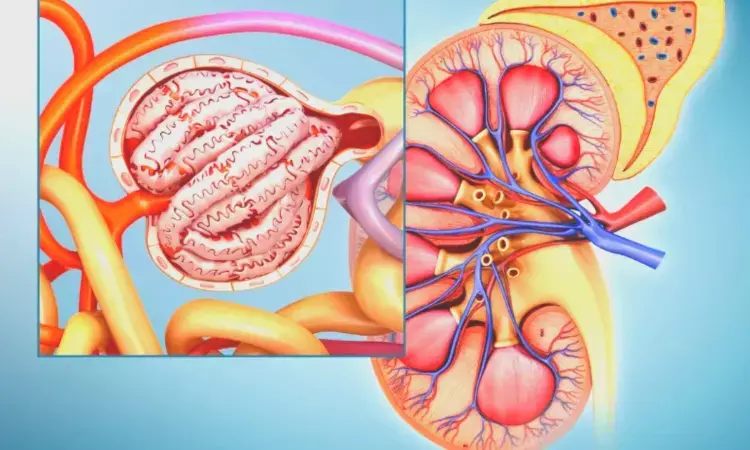- Home
- Medical news & Guidelines
- Anesthesiology
- Cardiology and CTVS
- Critical Care
- Dentistry
- Dermatology
- Diabetes and Endocrinology
- ENT
- Gastroenterology
- Medicine
- Nephrology
- Neurology
- Obstretics-Gynaecology
- Oncology
- Ophthalmology
- Orthopaedics
- Pediatrics-Neonatology
- Psychiatry
- Pulmonology
- Radiology
- Surgery
- Urology
- Laboratory Medicine
- Diet
- Nursing
- Paramedical
- Physiotherapy
- Health news
- Fact Check
- Bone Health Fact Check
- Brain Health Fact Check
- Cancer Related Fact Check
- Child Care Fact Check
- Dental and oral health fact check
- Diabetes and metabolic health fact check
- Diet and Nutrition Fact Check
- Eye and ENT Care Fact Check
- Fitness fact check
- Gut health fact check
- Heart health fact check
- Kidney health fact check
- Medical education fact check
- Men's health fact check
- Respiratory fact check
- Skin and hair care fact check
- Vaccine and Immunization fact check
- Women's health fact check
- AYUSH
- State News
- Andaman and Nicobar Islands
- Andhra Pradesh
- Arunachal Pradesh
- Assam
- Bihar
- Chandigarh
- Chattisgarh
- Dadra and Nagar Haveli
- Daman and Diu
- Delhi
- Goa
- Gujarat
- Haryana
- Himachal Pradesh
- Jammu & Kashmir
- Jharkhand
- Karnataka
- Kerala
- Ladakh
- Lakshadweep
- Madhya Pradesh
- Maharashtra
- Manipur
- Meghalaya
- Mizoram
- Nagaland
- Odisha
- Puducherry
- Punjab
- Rajasthan
- Sikkim
- Tamil Nadu
- Telangana
- Tripura
- Uttar Pradesh
- Uttrakhand
- West Bengal
- Medical Education
- Industry
Sparsentan superior to irbesartan in focal segmental glomerulosclerosis patients, reveals DUPLEX trial

USA: A groundbreaking clinical trial, known as the DUPLEX trial, has unveiled promising results in treating Focal Segmental Glomerulosclerosis (FSGS), a rare and debilitating kidney disorder. The study compared the efficacy of two medications, Irbesartan (IRB) and Sparsentan (SPAR), in patients suffering from FSGS, offering valuable insights into managing this challenging condition.
The phase III DUPLEX trial showed that sparsentan (Filspari) led to more complete and partial remissions of focal segmental glomerulosclerosis than irbesartan (Avapro).
"For a 108-week double-blind treatment period, 18.5% of sparsentan-treated patients achieved complete remission of FSGS versus 7.5% of irbesartan-treated patients (relative risk [RR] 2.47)," Michelle N. Rheault, MD, of the University of Minnesota Medical School in Minneapolis, and colleagues reported at the National Kidney Foundation (NKF) Spring Clinical meeting.
Of the patients on sparsentan, 37.5% had partial remission compared with 22.6% of those on irbesartan (RR 1.60). At the 36-week interim analysis point, those taking sparsentan also had a significantly higher probability of achieving partial remission.
FSGS is a chronic kidney disease characterized by scarring in the kidney's filtering units, leading to impaired kidney function and protein leakage into the urine. Currently, treatment options for FSGS are limited, emphasizing the urgency for novel therapeutic approaches.
The phase 3 DUPLEX trial evaluated the nephroprotective and antiproteinuric potential of the dual endothelin angiotensin receptor antagonist (DEARA) SPAR versus active control IRB in patients with FSGS. DUPLEX met its interim efficacy endpoint (EP); more patients achieved partial remission of proteinuria at 36 weeks with SPAR vs IRB. Still, after 108 wk, the greater antiproteinuric effect did not translate to a significant difference in eGFR slopes. Dr. Rheault and colleagues present additional results from the 2-y analysis.
The study included 371 patients (8-75 y) with primary or genetic FSGS, eGFR ≥30 mL/min/1.73 m2, and urine protein-to-creatinine ratio (UPCR) ≥1.5 g/g. They were randomized in a 1:1 ratio to SPAR or IRB (800 and 300 mg/d) for 108 wk.
EPs included complete remission of proteinuria (CR; UPCR <0.3 g/g), the proportion of patients reaching composite kidney EPs, and absolute change in eGFR from baseline to 4 weeks post cessation of study drug (wk 112). Safety (adverse events) was also evaluated.
The following were the key findings of the study:
· Over 108 wk, CR was achieved earlier and more frequently with SPAR vs IRB.
· Fewer patients reached the composite kidney EPs, and the absolute decline in eGFR from baseline was numerically lower with SPAR vs IRB.
· SPAR was generally well tolerated, with no clinically meaningful fluid retention.
· There were no instances of heart failure in either group.
The study showed that SPAR led to more frequent CR and demonstrated a consistent trend of lower absolute decline in eGFR and fewer patients reaching composite kidney EPs versus IRB after two years. The findings support a potential clinical benefit of SPAR for FSGS.
Reference:
Rheault M, et al "Sparsentan vs irbesartan in patients with focal segmental glomerulosclerosis (FSGS): results from the phase 3 DUPLEX trial" NKF 2024; Poster 406.
Dr Kartikeya Kohli is an Internal Medicine Consultant at Sitaram Bhartia Hospital in Delhi with super speciality training in Nephrology. He has worked with various eminent hospitals like Indraprastha Apollo Hospital, Sir Gangaram Hospital. He holds an MBBS from Kasturba Medical College Manipal, DNB Internal Medicine, Post Graduate Diploma in Clinical Research and Business Development, Fellow DNB Nephrology, MRCP and ECFMG Certification. He has been closely associated with India Medical Association South Delhi Branch and Delhi Medical Association and has been organising continuing medical education programs on their behalf from time to time. Further he has been contributing medical articles for their newsletters as well. He is also associated with electronic media and TV for conduction and presentation of health programs. He has been associated with Medical Dialogues for last 3 years and contributing articles on regular basis.
Dr Kamal Kant Kohli-MBBS, DTCD- a chest specialist with more than 30 years of practice and a flair for writing clinical articles, Dr Kamal Kant Kohli joined Medical Dialogues as a Chief Editor of Medical News. Besides writing articles, as an editor, he proofreads and verifies all the medical content published on Medical Dialogues including those coming from journals, studies,medical conferences,guidelines etc. Email: drkohli@medicaldialogues.in. Contact no. 011-43720751


